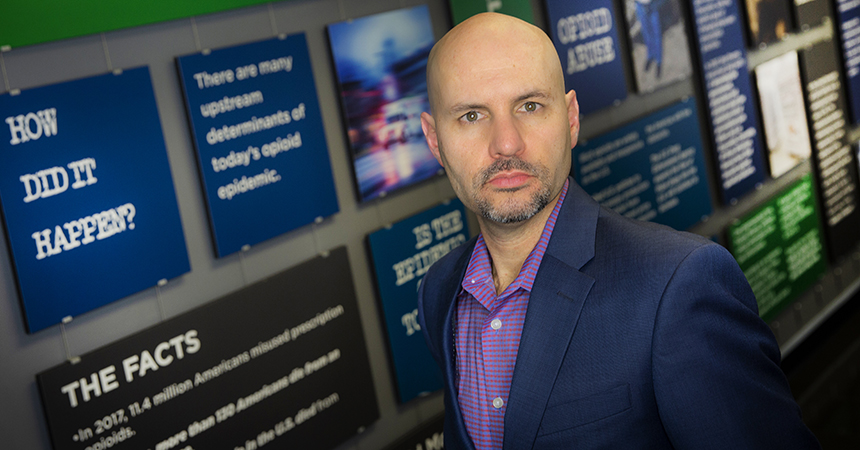The realities of ‘breaking bad’ – how one HSC researcher is attacking the opioid crisis
Related Links
He didn’t know it at the time, but when Dr. Scott Walters was growing up in San Diego in the mid 1980s, a next-door neighbor was concealing a homemade meth lab just across the fence and mere steps away from his bedroom window.
For some time, concerned parents in his family’s quiet cul-de-sac had reached out to police with suspicions about unusual comings and goings in the neighborhood, strange cars outside at odd hours, sometimes loud words or disagreements in the street.
A neighborhood watch was formed. Parents took pictures and wrote down license plates, but the drug trade was so prevalent in California at the time, officials could hardly address all the concerns from this and numerous other neighborhoods.
Drug activity was happening all over, in suburban residential areas where these illicit operations would be least suspected, to abandoned properties and rural geographies into the valleys, mountains and open desert beyond.
“Southern California was considered the methamphetamine capital of the world 35 years ago. In one single day in 1989, dozens of makeshift meth labs were raided by authorities in a surprising reveal of what had been lurking right next door,” said Dr. Walters, now a Regents Professor at the HSC School of Public Health (SPH), and Chair of a multi-state initiative funded by the National Institutes of Health (NIH) to combat the U.S. opioid crisis.
“The Los Angeles Times reported that day’s events of massive, coordinated raids throughout southern California were the largest drug bust in U.S. history,” Dr. Walters noted.
“Now, decades later, the war on drugs is still being waged, with new names and formulations that have entered the market, even more capable of devastating communities, families and the lives of those who use them.”
Since 2019, Dr. Walters has served as Steering Committee Chair for the HEALing Communities Study, part of the NIH HEAL (Helping to End Addiction Long-Term) Initiative, an aggressive national effort to speed scientific solutions to this public health crisis.
More than $350 million has been designated to this multi-year study under a cooperative agreement supported by the National Institute on Drug Abuse (NIDA), part of NIH, in partnership with the Substance Abuse and Mental Health Services Administration (SAMHSA).
The study’s goal is to reduce deaths by at least 40% over a three-year period in nearly 70 U.S. communities hit hardest by the opioid crisis – and to create a national model for saving future lives.
In the U.S. region including Texas, data comparing years 2020 to 2019 showed that use of the powerful, synthetic drug fentanyl went up by 57% and that methamphetamine use increased by 19%. Heroin use was 31% higher for 2020 than 2019.
The CDC reports that drug overdose deaths in Texas increased 34% – rising by more than one third – in 2020 versus 2019.
“The big takeaway here is the rise of fentanyl use, which explains why more people are dying,” Dr. Walters said.
Fentanyl is similar to morphine but 50-100 times more potent, reports the NIDA. Fentanyl is cheap to manufacture, but dosage impact can be unpredictable. Increasingly, it is being mixed with heroin or taken with oxycodone medications to even deadlier effect.
Taking solutions to the streets
Dr. Walters’ work has long focused on developing evidence-based solutions for substance use and other problem behaviors. Over time, he has become increasingly interested in implementation science, which puts into action the findings that research demonstrates can make a difference.
Public health awareness campaigns and grassroots efforts following this model have already been launched across the U.S. through the HEALing Communities Study and are beginning to make a difference.
“COVID-19 and the events of the last year threw these efforts for a loop,” Dr. Walters said. “Not only did drug use go up, but many of the actions we would normally take were inhibited. I’ve been so impressed with how quickly these communities retooled their efforts, adjusting some strategies and doubling down on others that could have an impact right now.”
“No state has been immune to the effects of the opioid epidemic. We all benefit from working together on this problem.”
As a young adult in San Diego, Dr. Walters never imagined where his future might lead, yet the impact of his work now and that of his colleagues is clear – solutions to the nation’s drug crisis are just as needed today as they were decades ago.
“Turning a problem of this magnitude around isn’t easy or quick, but it’s clear we make better inroads when we all work together,” he said.






Social media